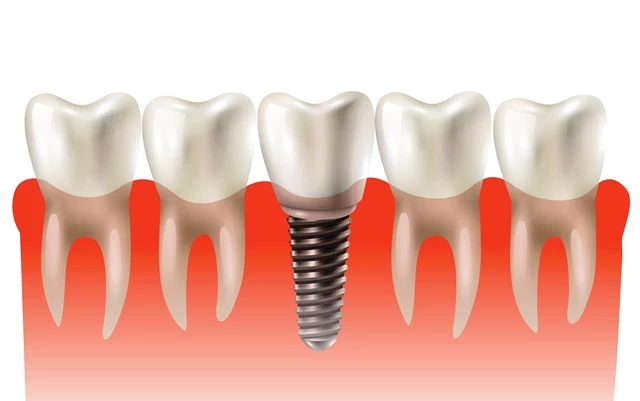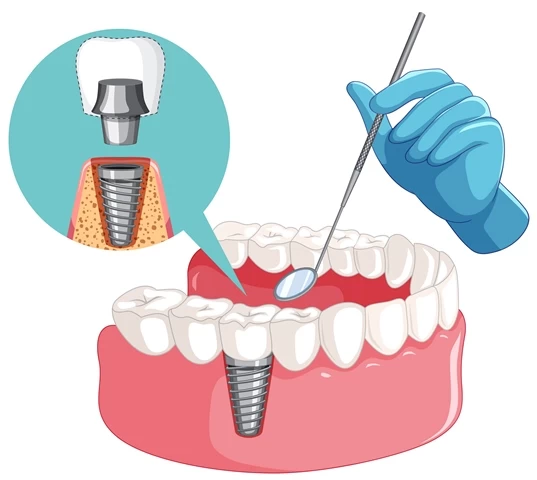
Dental Implantation in Dentistry
- Dental Implantation in Dentistry
- What is an Implant?
- At What Age Can Implants be Applied?
- What are the Advantages of Implantation?
- What are the Stages of Implantation?
Dentistry is a branch of medicine that focuses on the preservation, treatment, and improvement of dental and oral health. Dental caries, gum diseases, and tooth loss are common problems faced by many individuals. Tooth loss can occur due to various reasons and can have significant consequences on a person's daily life. There are several methods used in dentistry to treat tooth loss, with dental implantation being the most effective and permanent solution.
What is an Implant?
Dental implants are a permanent dental treatment method where artificial tooth roots are created and placed into the jawbone. An implant is a titanium screw-like structure that is inserted into the jawbone. The process of implant placement requires local anesthesia and involves a surgical procedure. Implants function as artificial tooth roots that can mimic the movements and functions of natural teeth. Porcelain crowns or prosthetics placed on implants provide an aesthetic appearance similar to natural teeth.
At What Age Can Implants be Applied?
Dental implantation is typically preferred in adults who have experienced tooth loss. Ideally, the development of the jawbones should be completed for implantation. Generally, this occurs at the end of adolescence or early adulthood. However, age alone is not a barrier to implantation. The individual's overall health condition and suitability of the jawbone are crucial factors to consider.
Implantation is not recommended for children whose jawbones are still in the process of growth. Therefore, implantation is usually preferred in individuals over the age of 18. However, in certain cases, such as early tooth loss or congenitally missing teeth, implantation can be performed at the end of adolescence before the completion of jawbone growth. These cases are assessed individually by a dentist, and if deemed suitable, implantation can be performed.

What are the Advantages of Implantation?
- Imitation of Natural Teeth: Implants can mimic the functions of natural teeth since they act as artificial tooth roots. They can be used for activities like eating, speaking, and chewing without any restrictions.
- Long-term Solution: Implants provide a more durable solution compared to other dental treatment options. When properly placed, implants can last a lifetime.
- Preservation of Adjacent Teeth: Unlike traditional bridges, adjacent teeth do not need to be cut or ground down. This preserves the integrity of healthy tooth structure.
- Prevention of Bone Loss: Implants are inserted into the jawbone, which prevents bone resorption. Over time, jawbone loss can occur due to tooth loss, but implants help prevent this.
- Aesthetic Appearance: Porcelain crowns or prosthetics placed on implants provide an aesthetic appearance similar to natural teeth, helping individuals regain their confidence.
What are the Stages of Implantation?
- Evaluation: Prior to implantation, a dentist conducts a series of X-rays and imaging tests to assess the oral structure and jawbone. This evaluation helps determine the suitability of the implant and the best placement location.
- Implant Placement: The implant placement procedure is performed under local anesthesia. The dentist makes a small incision in the jawbone and places the implant in the correct position. The implant is then allowed to heal and fuse with the jawbone.
- Healing Process: A waiting period is required for the implant to integrate with the jawbone. This period typically lasts a few months, during which a temporary prosthesis can be used.
- Temporary Prosthesis: During the healing process, a temporary prosthesis can be attached to the implant. This prosthesis provides an aesthetic and functional solution.
- Porcelain Crown Placement: Once the implant has fully healed, permanent porcelain crowns or prosthetics are placed. At this stage, the shape and size of the implant are measured to create a customized crown or prosthesis for the individual.
In conclusion, dental implantation in dentistry offers an effective, permanent, and aesthetic solution for tooth loss treatment. Implants can mimic the functions of natural teeth and provide long-term durability. Implantation does not harm adjacent teeth and prevents jawbone resorption. Therefore, implants are an ideal option for individuals experiencing tooth loss. However, not every patient may be suitable for implants, and the success of each implantation may vary. Therefore, it is important to consult with an experienced dentist for implantation and evaluation."





